人教版选修6 Unit 2 Poems Language study and reading task(共28张PPT)
文档属性
| 名称 | 人教版选修6 Unit 2 Poems Language study and reading task(共28张PPT) |  | |
| 格式 | zip | ||
| 文件大小 | 277.6KB | ||
| 资源类型 | 教案 | ||
| 版本资源 | 人教版(新课程标准) | ||
| 科目 | 英语 | ||
| 更新时间 | 2014-06-19 17:34:25 | ||
图片预览

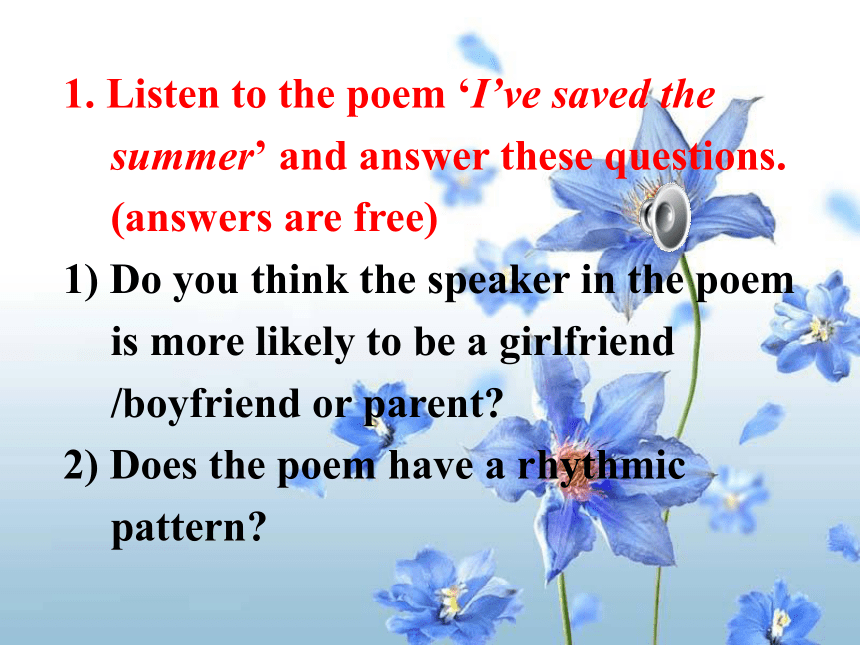
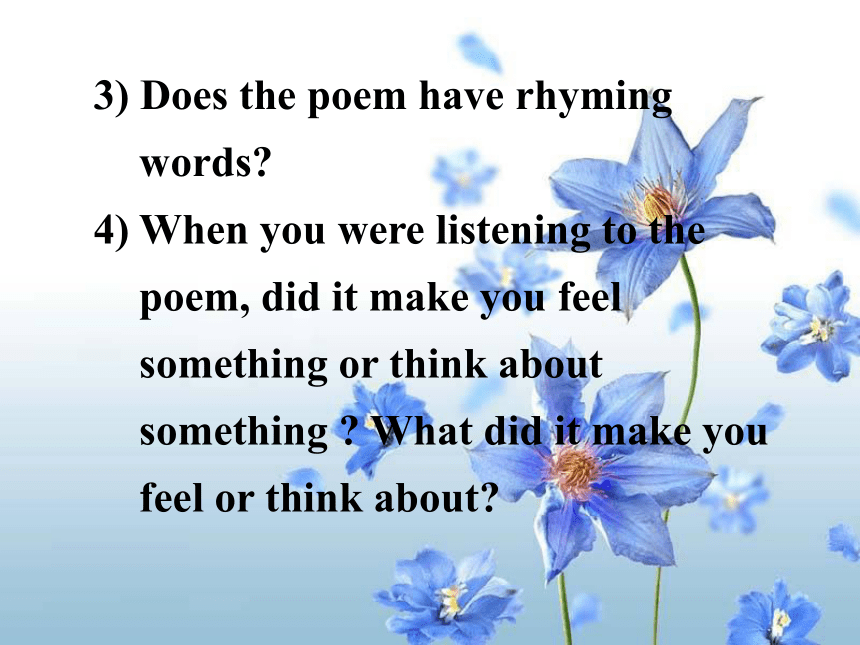
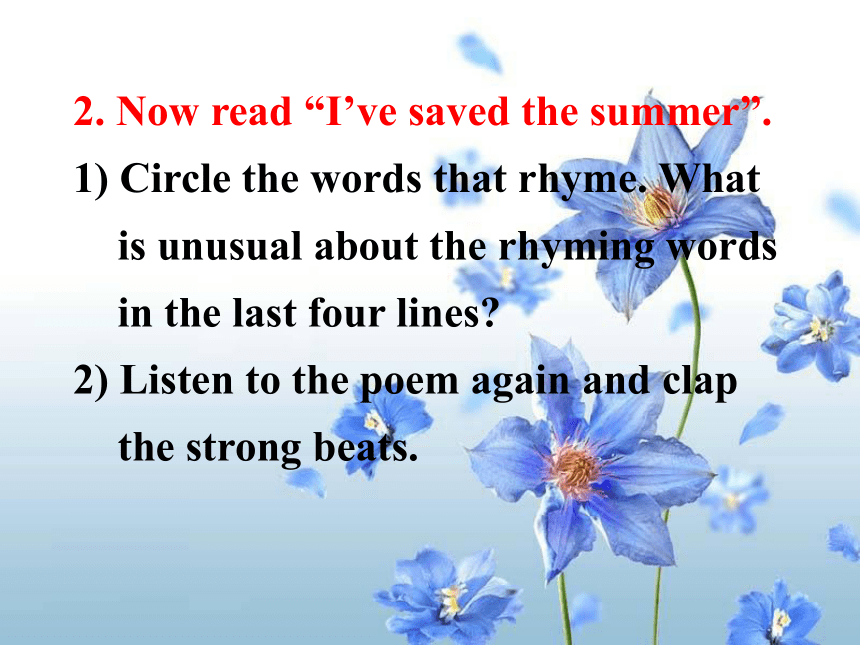

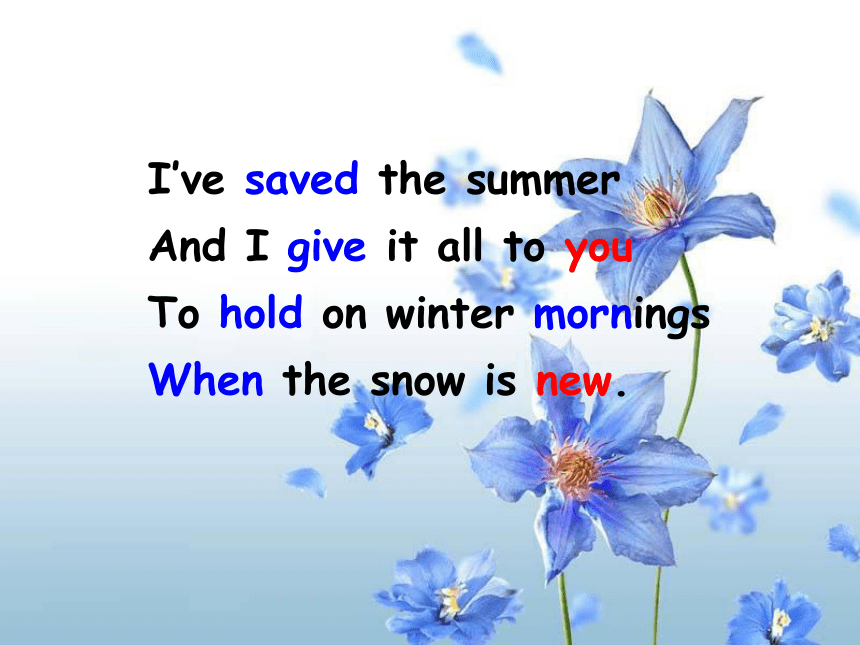
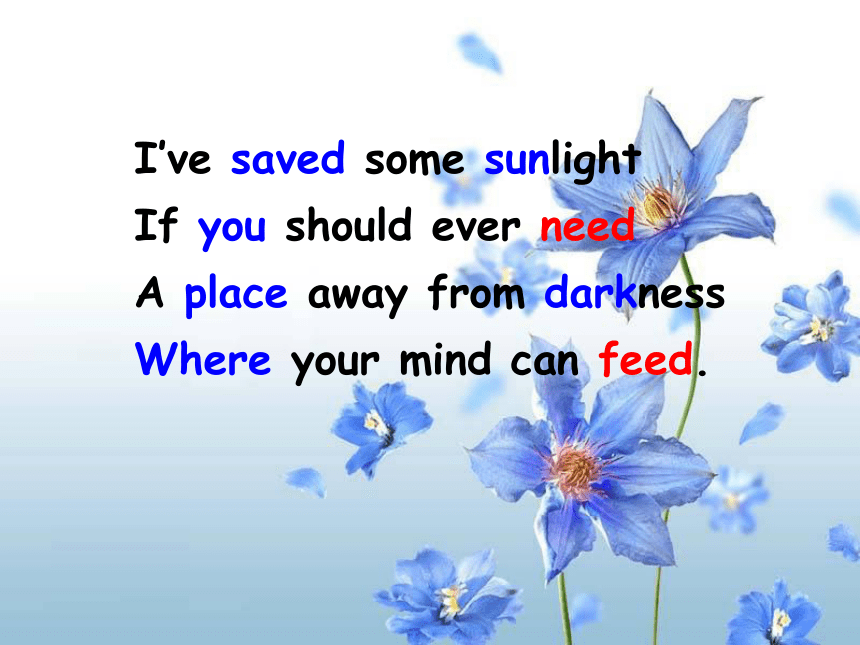

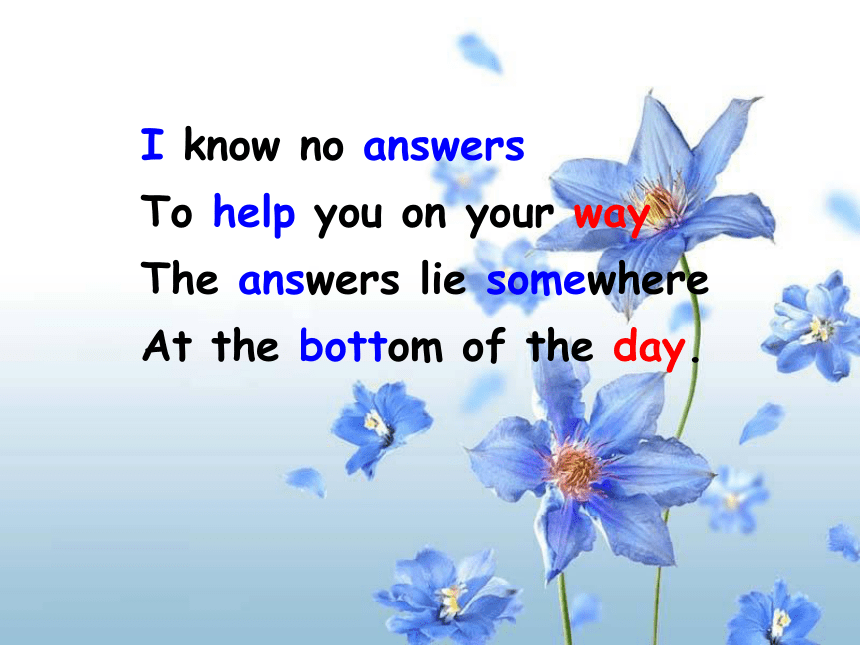
文档简介
课件28张PPT。Listening, reading and discussingUsing language1. Listen to the poem ‘I’ve saved the summer’ and answer these questions. (answers are free)
1) Do you think the speaker in the poem is more likely to be a girlfriend /boyfriend or parent?
2) Does the poem have a rhythmic pattern?3) Does the poem have rhyming words?
4) When you were listening to the poem, did it make you feel something or think about something ? What did it make you feel or think about?2. Now read “I’ve saved the summer”.
1) Circle the words that rhyme. What is unusual about the rhyming words in the last four lines?
2) Listen to the poem again and clap the strong beats.Rod McKuen I’ve saved the summer
And I give it all to you
To hold on winter mornings
When the snow is new.I’ve saved some sunlight
If you should ever need
A place away from darkness
Where your mind can feed.And for myself I’ve kept your smile
When you were but nineteen,
Till you’re older you’ll not know
What brave young smiles can mean.I know no answers
To help you on your way
The answers lie somewhere
At the bottom of the day. But if you’ve a need for love
I’ll give you all I own
It might help you down the road
Till you’ve found your own.
Rod McKuen1. Who is the speaker in the poem and who is he /she speaking to ? Give reasons to support your answer.
Maybe a parent speaking to a young adult child. Discussion2. Which of the following is the closest to the speaker’s message? Give a reason for your choice.
A. If it’s cold, I’ll warm you; if it’s dark, I’ll give you light; if you’re hungry, I’ll feed you; if you want to love , I’ll give it to you .B. Although the future may be difficult for you, whatever you need warmth and love, remember I’ll have some to give you.
C. While you’re away I’ll remember your smile and I’ll love you always. When you return, I hope you will love me.Language points1. Does the poem have a rhyming pattern?
pattern:
n. (1) 图案
This cloth has a pattern of blue and white squares. 这种布有蓝白格子的图案。(2) 模板, 式样
This cloth has a pattern of blue and white squares. 这种布有蓝白格子的图案。
v. form a pattern
He patterned himself upon a man he admired. 他模仿一个他钦佩的人。2. hold on
(1) hang on
Hold on please, I’ll just get a pen
(2) to continue in spite of difficulties
try and hold on until help arrives.单词联想:
hold back
hold down
hold forth
hold onto
hold to
hold sth./ sb. up阻挡, 抑制
压制, 限制
大发议论, 夸夸其谈
紧紧抓住不放, 保住
坚持, 信守, 忠于
推迟, 使耽搁3. I’ll also try out his way some time.
try out: trying something to find out about it 试用, 试验
Please try out red wine. 请试试我们的红葡萄酒。知识联系:
try one’s best
try on
try doing sth.
try to do sth.尽最大努力
试穿
试着做某事
尽力做某事4. inspire
to encourage
His noble example inspired the rest of us to greater efforts. 他那高尚的榜样激发我们大家更加努力。(2) to be the force which produces 启示, 使…产生灵感
His best music was inspired by the memory of his mother. 他最好的乐曲创作灵感来自怀念他的母亲。inspire sb. to do sth.
inspire +n. +in sb. = inspire sb. with + n.
5. let out
(1) express audibly; utter sounds (not necessarily words)
He let out a volley of oaths. 他像发连珠炮似地破口大骂。(2) bring out of a specific state he accidentally let out that he hadn’t been home for three weeks.Reading task P521. Listen to the tape and close your eyes, then tell us your impression on each poem.
2. Discuss and then write about the characteristics of each poem.Poem A ( Tang poem ):
This poem has beautiful imagery that conveys deep feelings. There are many things that this poem makes the reader think about: light heartedness and heavy heartedness, it contrasts morning and night, and creation and destruction. Poem B:
Number of lines:
Rhythm:
Rhyme:
Repetition:
Part of speech:adverb poemtwo sets of four linesregular strong beatfour pairs of rhyming lineshungrily is repeated at the
beginning of each line regularlythe adverb hungrily starts each line Poem C: song
This is a love song
Rhythm:
regular strong beat
Rhyme:
two pairs of rhyming lines
Repetition:
first two lines are repeated at the end of the song Poem D: cinquain
Number of lines:
Topic :
Poem E: haiku
Number of lines:
Number of syllables:fivesunshinethree17
1) Do you think the speaker in the poem is more likely to be a girlfriend /boyfriend or parent?
2) Does the poem have a rhythmic pattern?3) Does the poem have rhyming words?
4) When you were listening to the poem, did it make you feel something or think about something ? What did it make you feel or think about?2. Now read “I’ve saved the summer”.
1) Circle the words that rhyme. What is unusual about the rhyming words in the last four lines?
2) Listen to the poem again and clap the strong beats.Rod McKuen I’ve saved the summer
And I give it all to you
To hold on winter mornings
When the snow is new.I’ve saved some sunlight
If you should ever need
A place away from darkness
Where your mind can feed.And for myself I’ve kept your smile
When you were but nineteen,
Till you’re older you’ll not know
What brave young smiles can mean.I know no answers
To help you on your way
The answers lie somewhere
At the bottom of the day. But if you’ve a need for love
I’ll give you all I own
It might help you down the road
Till you’ve found your own.
Rod McKuen1. Who is the speaker in the poem and who is he /she speaking to ? Give reasons to support your answer.
Maybe a parent speaking to a young adult child. Discussion2. Which of the following is the closest to the speaker’s message? Give a reason for your choice.
A. If it’s cold, I’ll warm you; if it’s dark, I’ll give you light; if you’re hungry, I’ll feed you; if you want to love , I’ll give it to you .B. Although the future may be difficult for you, whatever you need warmth and love, remember I’ll have some to give you.
C. While you’re away I’ll remember your smile and I’ll love you always. When you return, I hope you will love me.Language points1. Does the poem have a rhyming pattern?
pattern:
n. (1) 图案
This cloth has a pattern of blue and white squares. 这种布有蓝白格子的图案。(2) 模板, 式样
This cloth has a pattern of blue and white squares. 这种布有蓝白格子的图案。
v. form a pattern
He patterned himself upon a man he admired. 他模仿一个他钦佩的人。2. hold on
(1) hang on
Hold on please, I’ll just get a pen
(2) to continue in spite of difficulties
try and hold on until help arrives.单词联想:
hold back
hold down
hold forth
hold onto
hold to
hold sth./ sb. up阻挡, 抑制
压制, 限制
大发议论, 夸夸其谈
紧紧抓住不放, 保住
坚持, 信守, 忠于
推迟, 使耽搁3. I’ll also try out his way some time.
try out: trying something to find out about it 试用, 试验
Please try out red wine. 请试试我们的红葡萄酒。知识联系:
try one’s best
try on
try doing sth.
try to do sth.尽最大努力
试穿
试着做某事
尽力做某事4. inspire
to encourage
His noble example inspired the rest of us to greater efforts. 他那高尚的榜样激发我们大家更加努力。(2) to be the force which produces 启示, 使…产生灵感
His best music was inspired by the memory of his mother. 他最好的乐曲创作灵感来自怀念他的母亲。inspire sb. to do sth.
inspire +n. +in sb. = inspire sb. with + n.
5. let out
(1) express audibly; utter sounds (not necessarily words)
He let out a volley of oaths. 他像发连珠炮似地破口大骂。(2) bring out of a specific state he accidentally let out that he hadn’t been home for three weeks.Reading task P521. Listen to the tape and close your eyes, then tell us your impression on each poem.
2. Discuss and then write about the characteristics of each poem.Poem A ( Tang poem ):
This poem has beautiful imagery that conveys deep feelings. There are many things that this poem makes the reader think about: light heartedness and heavy heartedness, it contrasts morning and night, and creation and destruction. Poem B:
Number of lines:
Rhythm:
Rhyme:
Repetition:
Part of speech:adverb poemtwo sets of four linesregular strong beatfour pairs of rhyming lineshungrily is repeated at the
beginning of each line regularlythe adverb hungrily starts each line Poem C: song
This is a love song
Rhythm:
regular strong beat
Rhyme:
two pairs of rhyming lines
Repetition:
first two lines are repeated at the end of the song Poem D: cinquain
Number of lines:
Topic :
Poem E: haiku
Number of lines:
Number of syllables:fivesunshinethree17
